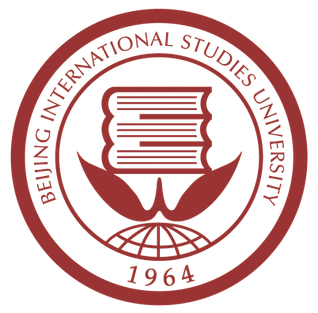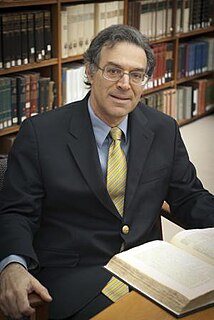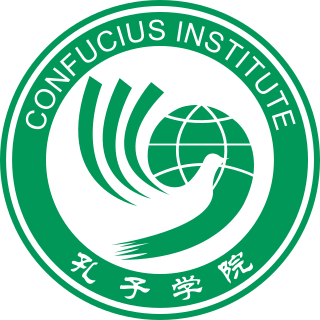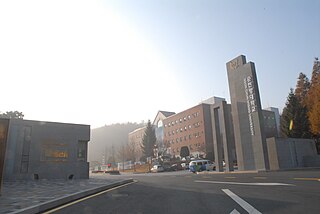Tu Weiming is a Chinese-born American philosopher. He is Chair Professor of Humanities and Founding Director of the Institute for Advanced Humanistic Studies at Peking University. He is also Professor Emeritus and Senior Fellow of Asia Center at Harvard University.
The New Culture Movement was a movement in China in the 1910s and 1920s that criticized classical Chinese ideas and promoted a new Chinese culture based upon progressive, modern and western ideals like democracy and science. Arising out of disillusionment with traditional Chinese culture following the failure of the Republic of China to address China's problems, it featured scholars such as Chen Duxiu, Cai Yuanpei, Chen Hengzhe, Li Dazhao, Lu Xun, Zhou Zuoren, He Dong, Qian Xuantong, Liu Bannong, Bing Xin, and Hu Shih, many classically educated, who led a revolt against Confucianism. The movement was launched by the writers of New Youth magazine, where these intellectuals promoted a new society based on unconstrained individuals rather than the traditional Confucian system. The movement promoted:

The Communication University of China (CUC) is a leading public university in Beijing. It is one of the China's key universities of 'Double First Class University Plan', directly administered by the Ministry of Education of the People's Republic of China. CUC developed from what used to be a training center for technicians of the Central Broadcasting Bureau that was founded in 1954. In April 1959, it was upgraded to the Beijing Broadcasting Institute (BBI) approved by the State Council. In August 2004, BBI was renamed Communication University of China. CUC is located in the eastern part of Beijing near the ancient canal, which occupies 463,700 square meters of land and a total of 499,800 square meters of buildings.

The Beijing International Studies University (BISU) is a public research university based in the city of Beijing, China. Founded in 1964, it was part of the national initiative to promote tertiary foreign language education. The institute grew out of a subsidiary of Xinhua News Agency and has developed into one of the most notable universities of foreign languages and cultural studies in China. Today, the university pioneers in the fields of international trade, tourism studies and hospitality management.
Herrlee Glessner Creel was an American Sinologist and philosopher who specialized in Chinese philosophy and history, and was a professor of Chinese at the University of Chicago for nearly 40 years. On his retirement, Creel was praised by his colleagues as an innovative pioneer on early Chinese civilization and as one who could write both for specialists and for the interested general public with cogency, lucidity, and grace.

Kenneth Pomeranz, FBA is University Professor of History at the University of Chicago. He received his B.A. from Cornell University in 1980, where he was a Telluride Scholar, and his Ph.D. from Yale University in 1988, where he was a student of Jonathan Spence. He then taught at the University of California, Irvine, for more than 20 years. He was elected a Fellow of the American Academy of Arts & Sciences in 2006. In 2013–2014 he was the president of the American Historical Association.

Confucius Institutes are public educational and cultural promotion programs funded and arranged currently by the Chinese International Education Foundation and formerly by Hanban, an organization affiliated with the Chinese government. The stated aim of the program is to promote Chinese language and culture, support local Chinese teaching internationally, and facilitate cultural exchanges. The organization has been criticized over concerns of the Chinese government's undue overseas influence and suppression of academic freedom.

Capital Normal University is a university in Beijing, China. It is a Chinese state Double First Class University Plan university, identified by the Ministry of Education of China. Founded in 1954, formerly known as Beijing Normal College. In 1992, the branch of Beijing Normal College was merged into Beijing Normal College, and the school was renamed Capital Normal University.

Soonchunhyang University (SCH) is a private university in Asan, South Korea.

Yunnan Normal University is in Kunming, the capital city of Yunnan Province.
Dali L. Yang is an American political scientist and sinologist. He is the William Claude Reavis Professor in the Department of Political Science and Senior Advisor to the President and Provost on Global Initiatives at The University of Chicago. Between 2010 and 2016, he was the founding Faculty Director of the University of Chicago Center in Beijing, a university-wide initiative to strengthen exchanges and collaboration with Chinese academic institutions. He is also a non-resident Senior Fellow at the Chicago Council on Global Affairs. He is a member of the Committee of 100, a member of the National Committee on U.S.-China Relations, and a member of the China Committee of the Chicago Sister Cities International Program. He is also on the Advisory Board of the Paulson Institute at the University of Chicago.
Edward Louis Shaughnessy is an American Sinologist, scholar, and educator, known for his studies of early Chinese history, particularly the Zhou dynasty, and his studies of the Classic of Changes.
Hanban, also known as Confucius Institute Headquarters, is the colloquial abbreviation for the Office of Chinese Language Council International. It was originally called the China National Office for Teaching Chinese as a Foreign Language, which was established in 1987. According to Hanban's official website, Hanban is "a public institution affiliated with the Chinese Ministry of Education" and is committed to "providing Chinese language and cultural teaching resources and services worldwide". Hanban's goals include "making Chinese language and culture teaching resources and services available to the world", "meeting the demands of overseas Chinese learners", and "contributing to the formation of a world of cultural diversity and harmony". Hanban aims to cultivate knowledge and interest in the Chinese language and culture around the world, especially in people who are not native speakers of Chinese. Hanban has worked "closely with overseas organizations to develop Chinese language courses in their respective countries".
The Confucius Institute (CI) program, which began establishing centers for Chinese language instruction in 2004, has been the subject of criticisms, concerns, and controversies during its international expansion.
Taiwan studies, or Taiwanese studies, is a multi-disciplinary academic division of area studies focused on studying Taiwan and the people on/in/of Taiwan both on its own and in comparison with other world areas. Academia Sinica, Taiwan's national level research institute, officially inaugurated its Institute of Taiwan History in 2004 following a long exploratory period beginning in 1986. Taiwan studies departments and centers have been established in numerous universities around the world and key Taiwan studies organizations have been established in North America (NATSA), Europe, and Japan. The first World Congress of Taiwan Studies (WCTS) was hosted by Taiwan's Academia Sinica on April 26–28, 2012, in Taipei, Taiwan. More recently, China has begun to establish its own controversial version of Taiwan studies in the United States via its Confucius Institutes.
The Princeton Institute for International and Regional Studies (PIIRS) is the main research center for international studies and area studies at Princeton University and is one of the oldest centers of its kind in the United States. The Institute focuses on an interdisciplinary approach and its associated faculty is drawn from more than 150 professors and other scholars from more than 25 different departments within Princeton. Its director is historian Stephen Kotkin, the John P. Birkelund ’52 Professor in History and International Affairs.
The Holy Confucian Church or Holy Church of Confucius or Holy Confucian Church of China is a body formed of many local Confucian churches or halls in China. The grassroots movement was initiated by Zhou Beichen, a disciple of the Confucian philosopher Jiang Qing, who founded the first holy church in Shenzhen in 2009. The aim of the movement was to develop a network of local Confucian churches throughout the country, eventually unifying into a national body and becoming the state religion of China. The Holy Confucian Church has received support from the Confucian Academy of Hong Kong, although it has developed independently from the latter.

China–Croatia relations refer to bilateral foreign relations between China and Croatia. Both countries established diplomatic relations on May 13, 1992. Croatia has an embassy in Beijing and a general consulate in Hong Kong. China has embassy and Confucius Institute in Zagreb.
Roger T. Ames is a Canadian-born philosopher, translator, and author. He is Humanities Chair Professor at Peking University in Beijing, China, Professor Emeritus of Philosophy at the University of Hawaiʻi at Mānoa, and a Berggruen Fellow. He has made significant contributions to the study of Chinese and comparative philosophy, in which he emphasizes the importance of understanding Chinese philosophy on its own terms rather than through the lens of Western philosophy.
Lionel M. Jensen is an American academic who is an associate professor of East Asian Languages and Cultures, concurrent associate professor of History, and a fellow at the Kellogg Institute for International Studies at the University of Notre Dame.








